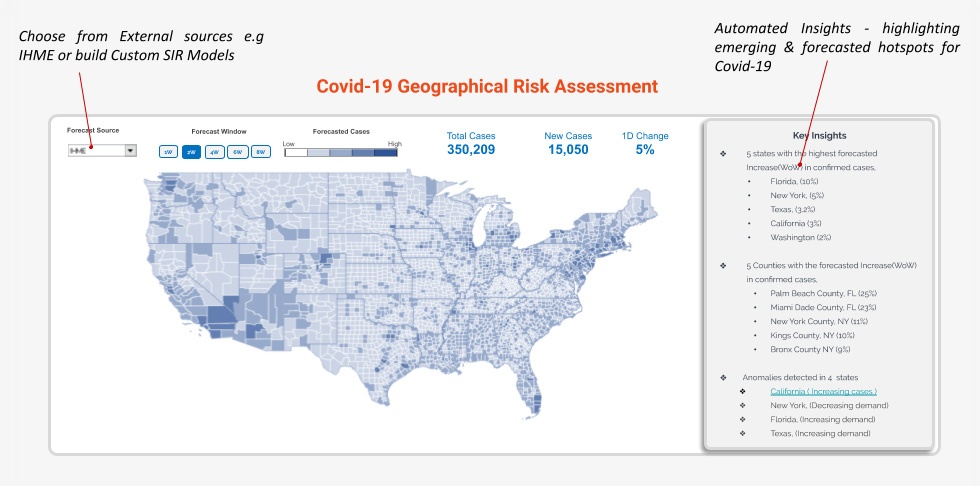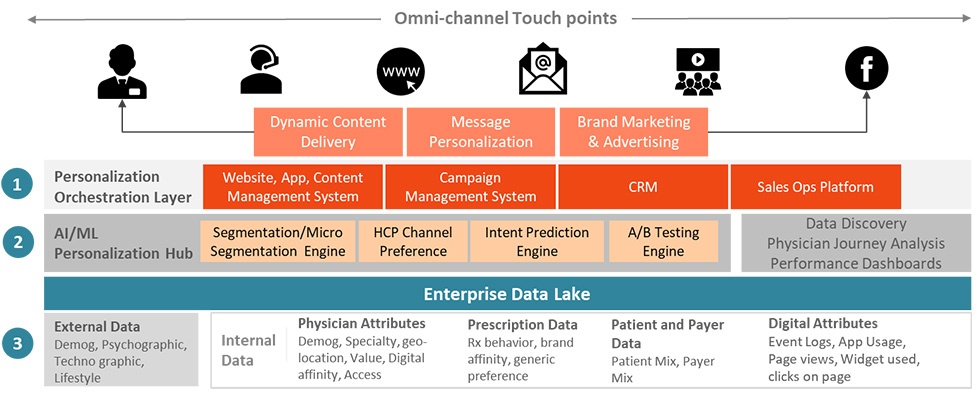COVID-19 pandemic brought with it a complete disruption to the existing normal operating procedures in most of the industries. The unprecedented situation due to the pandemic has struck some of the business functions disproportionately hard. The most impacted functions in the companies however are those where the workforces relied heavily on “on the field” presence for the execution of their work compared to those functions which could easily be converted into a remote working setup.
From the Life Sciences industry standpoint, the drug promotion via Medical Reps (MR) falls into the prior category. Although the industry as a whole has seen rapid adoption of digital solutions across the workstreams in the ongoing decade, their marketing efforts to the Health Care Providers (HCPs) still heavily rely on the Face to Face (F2F) interaction of the Reps with the Physicians.
This status quo however has been challenged by the ongoing COVID pandemic, with the social-distancing norms in place. There are estimates of 92% drop in F2F HCP engagements in April 2020 compared to 6 months ago[1]. It is also estimated that in the new post-pandemic normal, the frequency of F2F engagements will shift as much as by 65% to quarterly/annual rather than the weekly/monthly norms prevalent pre-COVID2. This is indeed a massive blow to the existing Pharma sales and marketing approach and has seen many of the companies rapidly scale up their digital engagement channels to fill the gap. The use of these digital channels for HCP engagement has seen a 2x increase from their pre-pandemic levels.[2]
The current COVID driven environment has several key implications for the Lifesciences organizations in their effort to meaningfully engage with HCPs.
- Impact on Sales & Marketing Channel Mix – Restrictions on in-person meetings have lead to reduced access to HCPs, canceled/postponed training sessions, and canceled conferences and events, all of which were major marketing methods till now. Pharma and other Lifesciences companies have to accelerate their sluggish digital transformation initiatives and enable a true omnichannel digital experience for HCPs
- Digital engagement channel optimization – The digital omnichannel push needs to account for varying pysician preferences for the type of digital channel engagement, based on factors like therapeutic area, demography, and personal preferences.
- Personalized, contextual messages for better engagement– Physicians at the front lines have to balance innovation and efficiency while dealing with the increased pandemic workload. As a result, engagement and interaction frequency with HCPs have decreased abruptly. With this sudden shift, there is a need for communication to be crisp and contextual for it to be effective.
This brings us to an important question of how the Bio-Pharmaceutical companies should navigate the current shock concerning HCP engagement and what lies ahead for them. Pharma Commercial Teams would need a strategic HCP engagement approach that manages the immediate COVID situation as well as builds capabilities for the new digital-driven normal.
As the Bio-pharma companies scramble to optimize their marketing efforts in the current times, they need to formulate a strategy which tackles the problem in phases:
- Now: Immediate Priorities to manage COVID situation (next 1-3 months) – Set of tactical initiatives and workarounds to the existing HCP engagement methodologies, meant to strictly tackle only the immediate priorities around COVID-19 impact
- Next: Accelerate digital capabilities build-up to drive Omnichannel HCP engagement (in 3-6 months ) – Strategic initiatives to accelerate and deliver a highly engaging digital experience for HCPs. These will fundamentally help in shifting and realignment of biopharma omnichannel engagement capabilities in post-COVID realities.
(Now) Immediate Priorities to manage HCP promotions in COVID situation
As an immediate measure, Bio-Pharma companies need to evaluate the impact of COVID-19 on HCPs’ practice – Rx, patient counts, geographical impact, etc, and Field Reps access to HCPs. It is imperative that Biopharma companies create a COVID control room, which integrates external trigger impact data with internal data sources to truly assess the impact of COVID situation (and potentially other external triggers and shocks) on their sales & marketing plans.

As the COVID impact is quantified, bio-pharma can synthesize the same to adjust the tactical call plans for their promotional activities. The critical parameters to consider while making changes to the call action models would be:
- Incorporate external COVID impact triggers at geo, HCP level
- Defining and quantifying the digital affinity of physicians
- Optimization of cross-channel (Digital & Rep) targeting frequency
- Dynamic adjustments to the call-plan (digital mix, frequency) as the COVID situation evolves
(Next) Accelerate digital capabilities build-up to drive Omnichannel HCP engagement
Once the immediate priorities related to the pandemic are solved, companies can utilize the learnings and key insights from the pandemic times to further advance their digital engagement strategy. The evaluation of what went right and what were the misses in the earlier stage should also be used to formulate a long-term digital and omnichannel engagement strategy. There is also, a lot to learn from Digital-natives who have, highly effectively, leveraged digital channels to driven customer engagement.
Bringing these best-practices from Digital natives together with Bio-pharma context can help accelerate the digital transformation of the industries HCP engagement approach.
| Best-practices and Learnings from Digital Natives | Lifesciences Ecosystem Context |
|---|---|
| Focus on differentiated HCP experience | Physicians have different interaction points, interests, and requirements including clinical content, CMEs, studies, samples, copay coupons, patient counseling material, etc. and hence differentiated experience enables engagement. |
| Volume and variety of data | Pharma has access to multi-dimensional physician data in terms of demography, preferences, prescription patterns, patient/payer mix profiles via claims, digital affinity to micro-segment physicians, and uncover preferences, behaviors, and personalized needs. |
| HCP/Customer Journey management and personalization | Advanced analytics and ML-based approaches can leverage the available data to predict intents, recommend interventions, and seamlessly deliver them via physician engagement platform and processes. |
| Omnichannel execution | Multi-channel interaction provides a foundation platform for delivering these experiences across digital as well as non-digital channels. |
| Measure, Learn & Improve | A/B testing driven digital engagement experimentation anchored on performance-driven, yet responsive targeting strategies. |
To accelerate their digital transformation journey, biopharma companies need to inculcate these best practices into their HCP digital marketing capability. An integrated Digital Engagement solution will help biopharma companies create and deliver omnichannel personalized experiences for HCPs, by enabling real-time AI/ML-driven next-best-action recommendations and precision targeting strategies based on their preference and intents.
COVID pandemic is an unprecedented global event, which will radically alter our behaviors, expectations, and interactions. Earlier rules of engagement are now getting irrelevant at a pace that is faster than ever before. To maintain(and grow) their share of voice and engagement with HCPs, bio-pharma organizations can no longer afford to follow the “digital-addon” approach. They have to fundamentally re-design their HCP engagement framework, as a Digital-driven strategy, $to stay relevant, to stay ahead and keep growing.
